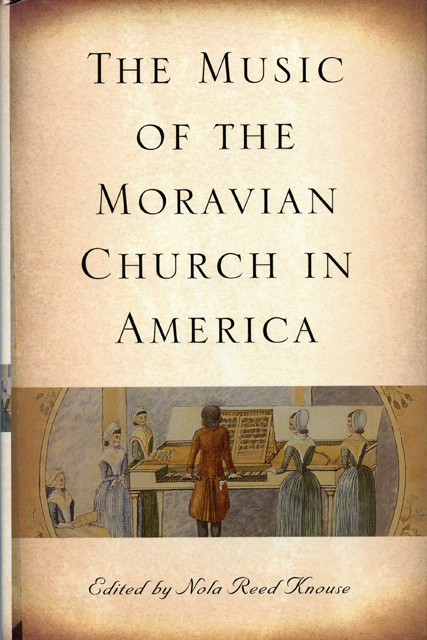Book contents
- Frontmatter
- Contents
- List of Illustrations
- Foreword
- Preface
- Acknowledgments
- 1 The Moravians and Their Music
- 2 Moravian Worship: The Why of Moravian Music
- 3 Hymnody of the Moravian Church
- 4 Moravian Sacred Vocal Music
- 5 The Organ in Moravian Church Music
- 6 The Role and Development of Brass Music in the Moravian Church
- 7 The Collegia Musica: Music of the Community
- 8 Music in Moravian Boarding Schools through the Early Nineteenth Century
- 9 The Piano among the Moravians in the Eighteenth and Nineteenth Centuries: Music, Instruction, and Construction
- 10 Moravian Music: Questions of Identity and Purpose
- Appendix 1 Biographical Sketches
- Appendix 2 A Moravian Musical Timeline
- Bibliography
- List of Contributors
- Index
- Eastman Studies in Music
7 - The Collegia Musica: Music of the Community
Published online by Cambridge University Press: 10 March 2023
- Frontmatter
- Contents
- List of Illustrations
- Foreword
- Preface
- Acknowledgments
- 1 The Moravians and Their Music
- 2 Moravian Worship: The Why of Moravian Music
- 3 Hymnody of the Moravian Church
- 4 Moravian Sacred Vocal Music
- 5 The Organ in Moravian Church Music
- 6 The Role and Development of Brass Music in the Moravian Church
- 7 The Collegia Musica: Music of the Community
- 8 Music in Moravian Boarding Schools through the Early Nineteenth Century
- 9 The Piano among the Moravians in the Eighteenth and Nineteenth Centuries: Music, Instruction, and Construction
- 10 Moravian Music: Questions of Identity and Purpose
- Appendix 1 Biographical Sketches
- Appendix 2 A Moravian Musical Timeline
- Bibliography
- List of Contributors
- Index
- Eastman Studies in Music
Summary
Although sacred vocal music and hymns have been the central focus of the musical life of the Moravians from their earliest years, at no time in their history have they eschewed the use of musical instruments. With no dividing line between “sacred” and “secular” aspects of life, the Moravians could adopt (and adapt) many positive features of their surrounding culture for their life of personal and communal piety and evangelism. Even their emphasis on the primacy of the text did not lead them to avoid the use of stringed and wind instruments in addition to the organ for their anthems; from the middle of the eighteenth century, Moravian composers wrote very few sacred vocal works without such accompaniment. Moreover, although the Moravian composers were careful to avoid obscuring the text through contrapuntal writing, their instrumental parts were not simplistic; they require accomplished players.
The festival services at which these anthems were to be sung, therefore, necessitated the presence of a competent instrumental and vocal ensemble. Not only did the individual musicians themselves need adequate training, but the ensemble as a whole could only benefit from playing together.
The Moravian composer, editor, and administrator Christian Ignatius LaTrobe wrote of music in Moravian life and worship:
In most of the Brethren's settlements, there is likewise a small band of vocal and instrumental performers, composed of persons voluntarily engaging their services. They sometimes meet for practice, and on particular occasions, enliven the service by the performance of the following, or similar Anthems, suited to the subjects under contemplation.
The practice of Instrumental Music is recommended by the Brethren, as a most useful substitute for all those idle pursuits, in which young people too often consume their leisure hours; and since its application as an accompaniment and support to the voiceis calculated to produce the most pleasing effect, its use in the Church has been retained.
These two needs—of accomplished musicians for worship and of appropriate recreational activities—combined to give rise to one of the most fascinating and significant aspects of the Moravian musical culture: their instrumental and vocal music in the community, apart from formal worship.
- Type
- Chapter
- Information
- The Music of the Moravian Church in America , pp. 189 - 211Publisher: Boydell & BrewerPrint publication year: 2009



